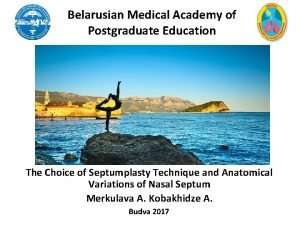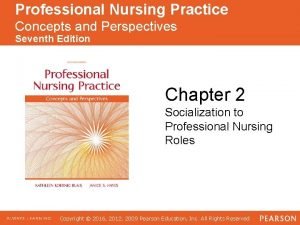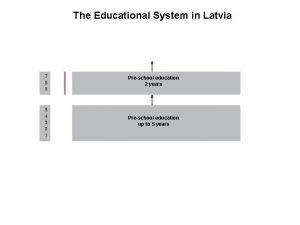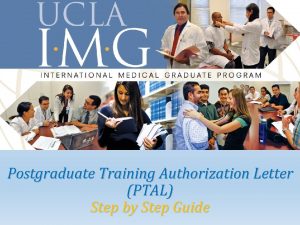Postgraduate Educational opportunities Postgraduate Educational opportunities While the

























- Slides: 25

Postgraduate Educational opportunities

Postgraduate Educational opportunities While the end of pharmacy school may seem a lifetime away, now is the time to begin planning your postgraduate education. Even for the decreasing number of you who will graduate and enter practice immediately, your education cannot end then. Pharmacy school provides an excellent basis for entering practice, but there is more to learn after you graduate-much, much more.

� Among the formal educational options open to the new pharmacy graduates are residencies, fellowships, traineeships, and graduate school.

Residencies �Students pharmacists are increasingly choosing to go into residency programs after graduation. This path may soon be just as common for a pharmacist to pursue a residency as it has been for physicians.

Residencies are valuable experiences because they offer a systematic educational focus in a real-world setting. Each residency program is headed by a preceptor who takes personal responsibility for assuring that each resident has a quality learning experience.

Through rotations in various clinical or other areas, pharmacy residents have the opportunity to learn about different types of patients and how various parts of the pharmacy or facility work by talking directly with patients, physicians, nurses, and pharmacy managers or supervisors. While it is possible to gain these skills and knowledge in other ways, the residency facilitates their acquisition in a short amount of time

Residencies have been common in hospital and healthsystem pharmacy since the 1960 s, and they are now spreading to community pharmacies. First begun in the mid-1980 s, community pharmacy residencies have grown in prominence and number since the late 1990 s. several dozen community pharmacy residency programs are now accredited, and they offer a growing number of slots for innovative student pharmacists who want to expand medication therapy management into the nation's chain and independent community pharmacies.

Types of Pharmacy Residency Programs Postgraduate year 1 residencies - Community pharmacy - Managed care pharmacy - Pharmacy non-practice yearlong residencies - Association management

Postgraduate year 2 residencies - Ambulatory care pharmacy - Critical care pharmacy - Emergency medicine pharmacy - Geriatric pharmacy - Informatics - Infectious disease pharmacy - Internal medicine pharmacy - Cardiology pharmacy - Managed care pharmacy systems - Drug information

- Medication-use safety - Nuclear pharmacy - Nutrition support pharmacy - Oncology pharmacy - Pediatric pharmacy - Pharmacotherapy - Health-System pharmacy administration - Psychiatric pharmacy - Solid organ transplant pharmacy

In 2003, ASHP recognized its accreditation standards into postgraduate year 1 ( PGY 1) and year 2 (PGY 2). PGY 1 programs can be conducted at one or more sites, and colleges of pharmacy can participate as sponsoring organizations. Residents learn about managing and improving the medication-use process, providing evidence-based, patient -centered medication therapy management with interdisciplinary teams, exercising leadership and practice management skills, demonstrating project management skills, providing medication and practice related education/training, and using medical informatics.

�PGY 2 pharmacy residency programs focus on a specific area of practice, such as primary care/ambulatory, critical care, drug information, geriatrics, oncology, psychiatric, internal medicine, and other areas. There also other non-practice residencies available to pharmacists like Association management residency program. � Stipends for residencies are generally about one half of what a starting pharmacist would earn. Benefits of employment are usually provided.

Fellowships and traineeships The important distinction between a residency and a fellowship is that the residency is practice-oriented while the fellowship has a research focus. Also where there might be several residents in a given pharmacy training under one preceptor, there is usually one fellow. In recent years, traineeships have grown in number and popularity, as practicing pharmacists have sought ways to enhance their knowledge and skills without interrupting their practices for an extended ( usually one year) residency or fellowship.

Many different areas-most of them clinical- are now available for pharmacists interested in completing a fellowship. The major sponsor of fellowships is the American College of Clinical Pharmacy Research Institute. It uses grants from the pharmaceutical industry to support the fellowship programs.

As with residencies, stipends for fellowships are about one half of a starting pharmacist's salary. Employment benefits are usually provided. Fellowships, which may last for one or two years, are intensive research-oriented experiences and are therefore excellent ways to prepare for a career in academia or pharmaceutical industry. The fellow generally spends the entire time on a small number of research projects, including formulating the methods, conducting the research, and writing a manuscript for publication.

Traineeships are generally conducted for a few days ( often from Sunday through Friday) at leading institutions or facilities specializing in the disease or area of interest. A limited number of pharmacists are accepted for each session, and they learn the latest concepts in clinical areas.

Using this intensive experience as a springboard, the practitioners then take their new skills and knowledge back to their practice setting, where they implement what they have learned in the traineeships. In some cases, pharmacists continue their training through interactions with local groups with interests in that disease or condition.

Type of Fellowship or Traineeship American Society of Health System Pharmacists Research and Education Foundation ü Anticoagulant traineeship ü Asthma care traineeship ü Stem cell transplantation traineeship ü Diabetes patient care traineeship ü Oncology patient care traineeship ü Pain management traineeship

American College of Clinical Pharmacy Research Institute �Cardiovascular �Critical care �Infectious disease therapeutics �Oncology �Pharmacoecomics and Outcomes �Psychopharmacy �Transplantation

American Society of Consultant Pharmacists Research and Education Foundation �Alzheimer's/dementia traineeship �Disease pharmacotherapy traineeship in heart failure, osteoporosis, and osteoarthritis �HIV/AIDS pharmacotherapy traineeship �Gero. Psych/behavioral disorders traineeship �Pain management traineeship �Parkinson's disease traineeship �Thrombosis prevention and management traineeship

Graduate studies For the student who wishes to pursue a researchoriented career in academia or pharmaceutical industry, graduate school is often the best path to take. Graduate studies are academically based experiences that focus on the student’s research abilities, including literature review and analysis, statistical expertise, language skills, and in-depth knowledge of the field of study

Many strong graduate programs are available in pharmacy and related disciplines. In addition to the pharmacy graduate programs, many pharmacists have chosen to enter business, law, or medical schools.

To apply to most graduate schools, you will need to take the Graduate Records Examination or other national tests and provide the school with transcripts and references. The graduate school to which you plan to apply can provide information about these items.

Pharmacy education: A lifelong experience Pharmacy school does not teach its students everything they need to know for pharmacy practice. no one-in any fieldcan leave school and assume that they know everything they will need to be a good practitioner for a lifetime. There always new drugs, new diseases, new ideas, and new laws. The learning really never stops, and the potential opportunities offered by residencies, fellowships, traineeships, and graduate school should be seriously considered by every pharmacy graduate as a mean of being well prepared to deal with the pharmacy world of today and tomorrow.

Thank You
 Do while loop adalah
Do while loop adalah Belarusian medical academy of postgraduate education
Belarusian medical academy of postgraduate education Kramer's postgraduate resocialization model
Kramer's postgraduate resocialization model Difference between postgraduate and undergraduate
Difference between postgraduate and undergraduate Postgraduate education
Postgraduate education Undergraduate graduate postgraduate
Undergraduate graduate postgraduate Susi grant rates
Susi grant rates Alexmed postgraduate
Alexmed postgraduate Formsl letter
Formsl letter Clinical governance postgraduate
Clinical governance postgraduate Difference between postgraduate and undergraduate
Difference between postgraduate and undergraduate Tư thế ngồi viết
Tư thế ngồi viết ưu thế lai là gì
ưu thế lai là gì Thẻ vin
Thẻ vin Cái miệng bé xinh thế chỉ nói điều hay thôi
Cái miệng bé xinh thế chỉ nói điều hay thôi Thơ thất ngôn tứ tuyệt đường luật
Thơ thất ngôn tứ tuyệt đường luật Các châu lục và đại dương trên thế giới
Các châu lục và đại dương trên thế giới Từ ngữ thể hiện lòng nhân hậu
Từ ngữ thể hiện lòng nhân hậu Diễn thế sinh thái là
Diễn thế sinh thái là Ví dụ giọng cùng tên
Ví dụ giọng cùng tên Phép trừ bù
Phép trừ bù Hát lên người ơi
Hát lên người ơi Sự nuôi và dạy con của hươu
Sự nuôi và dạy con của hươu đại từ thay thế
đại từ thay thế Vẽ hình chiếu vuông góc của vật thể sau
Vẽ hình chiếu vuông góc của vật thể sau
















































